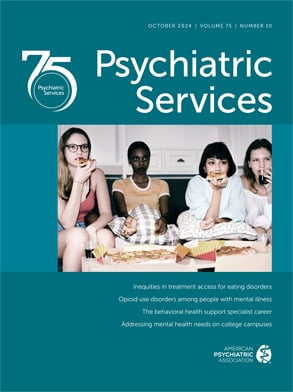This issue of the journal includes three contributions that highlight a matter of increasing importance: the large numbers of people with mental health problems who are involved in the criminal justice system. One is an excellent study by Steadman and colleagues of the prevalence of mental illness in jails. The second is an evaluation of a successful jail diversion program that works by focusing on the quality of relationships between staff and program participants. The third is a mother's account of what happened when her call to a local crisis line for help with her suicidal son led to the arrival of several police cars.
To better understand the scope and impact of this problem, the Committee on Psychiatry and the Community of the Group for the Advancement of Psychiatry asked "Dear Abby" to put a notice in her column in June 2007 asking for letters from individuals and families who had become involved with the criminal justice system as a result of mental illness. Over the course of about two years, more than 2,500 letters were received from all over the country, and they continue to arrive. The mother's story presented in the Personal Accounts column is one of them. The committee members realized that the issue is much bigger than we had imagined.
These stories reflect a number of powerful themes. In particular, it became clear that people with mental health problems who are inappropriately imprisoned are not only those with defined serious mental illnesses. The letters told many painful stories of men and women with complex co-occurring conditions—mental illnesses, substance abuse, trauma-related symptoms, developmental problems, brain injury, and even general medical conditions—whom the service system had failed and who wound up in jail. A series of minor offenses that could have been handled outside the criminal justice system instead led to long periods of incarceration. It is particularly distressing to know that for many of these individuals, simple and inexpensive interventions by a well-organized local care system could have prevented these tragic outcomes.
For people with serious mental illnesses and complex disabling conditions, criminal justice involvement is an expectation—not an exception—yet the system fails to account for it. Despite the efforts of states, counties, providers, clinicians, and advocates, the system is organized for failure, with jail as the ultimate safety net. Creating special funding streams in a dysfunctional system will not solve the problem. Instead, all of our existing resources must be used more effectively to better engage individuals at risk of incarceration. There are strategies that properly applied in a timely way can help people avoid jail and achieve recovery. We are all capable of—and responsible for—engaging in a process to improve care for this population. As a committee we are planning to tackle this issue in our work, and we invite everyone to join us.

